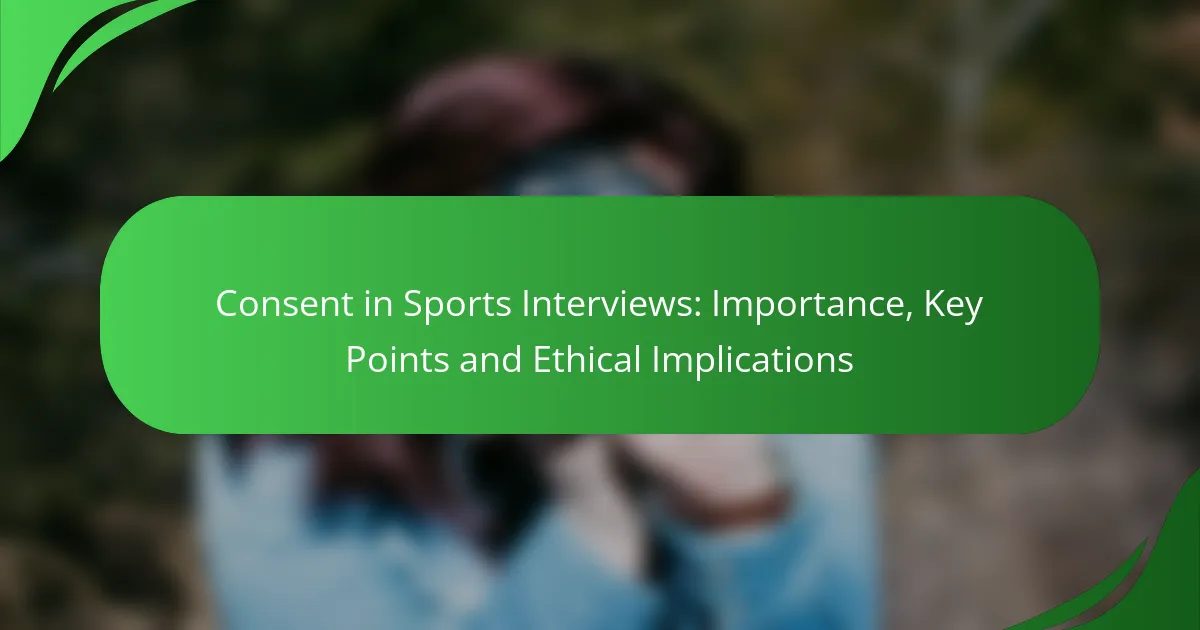Consent is a fundamental aspect of sports interviews, ensuring that athletes feel respected and comfortable while sharing their experiences. By prioritizing informed consent and the ability to withdraw at any time, interviewers can create a safe and ethical environment that empowers athletes to express themselves freely. Clear communication of consent terms further enhances the integrity of the interview process, protecting the rights and well-being of all participants.
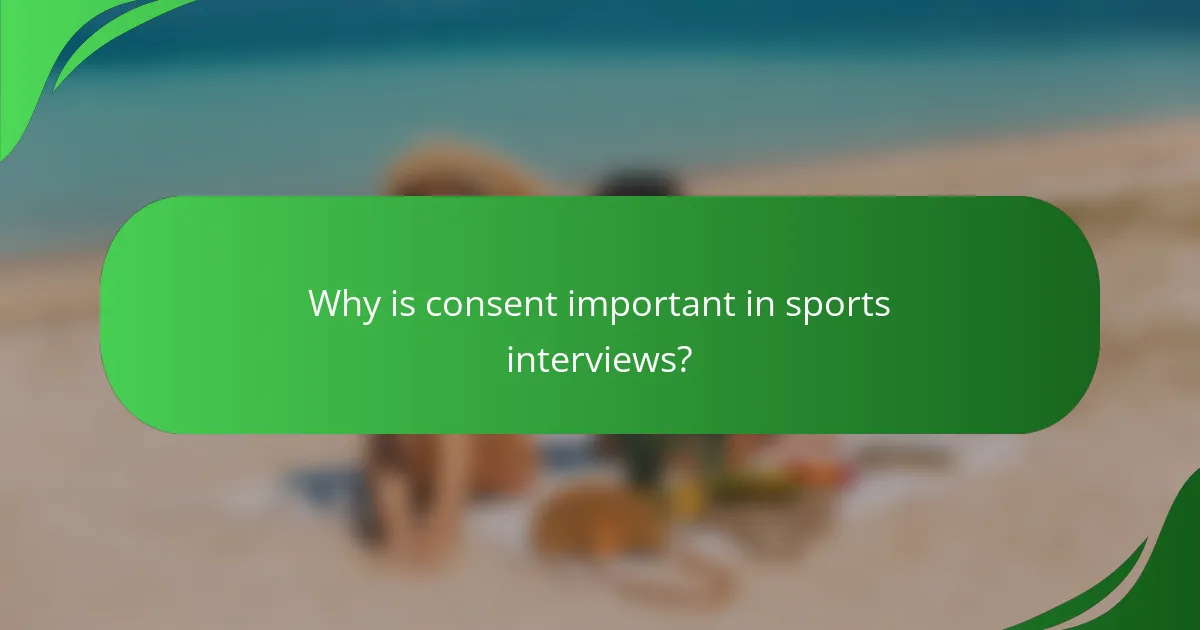
Why is consent important in sports interviews?
Consent is crucial in sports interviews as it respects the autonomy of athletes and ensures their comfort during discussions. Obtaining consent fosters a safe environment where athletes feel empowered to share their thoughts and experiences without fear of misrepresentation or exploitation.
Protects athlete privacy
Consent protects athlete privacy by allowing them to control what personal information is shared during interviews. Athletes may have sensitive topics they prefer not to discuss, and respecting their boundaries helps maintain their dignity and trust.
For example, an athlete might consent to discuss their performance but not their personal life. Clear communication about what will be covered can prevent uncomfortable situations and ensure that the interview remains respectful.
Enhances trust between parties
Establishing consent enhances trust between athletes and interviewers, creating a collaborative atmosphere. When athletes know their rights are acknowledged, they are more likely to engage openly and honestly.
Trust can be built through transparent practices, such as informing athletes about how their statements will be used. This openness encourages a more genuine dialogue, benefiting both the athlete and the interviewer.
Ensures ethical reporting
Consent is a cornerstone of ethical reporting in sports journalism. It ensures that the information gathered is obtained fairly and responsibly, aligning with professional standards of conduct.
Journalists should always seek explicit consent before publishing sensitive content. This practice not only upholds ethical standards but also protects the integrity of the sport and the individuals involved.
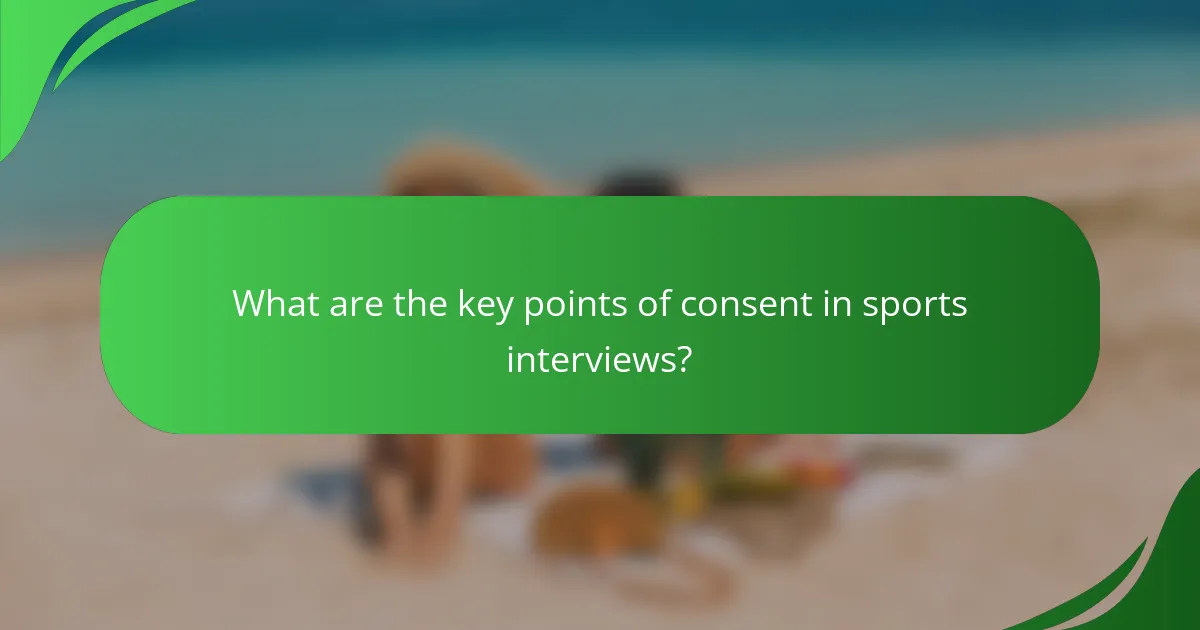
What are the key points of consent in sports interviews?
Consent in sports interviews is crucial for ensuring that athletes are comfortable and willing to participate in discussions about their experiences. Key points include informed consent, the ability to withdraw consent, and age considerations, all of which help protect the rights and well-being of interview subjects.
Informed consent requirements
Informed consent requires that athletes understand what they are agreeing to before participating in an interview. This includes providing clear information about the interview’s purpose, how the information will be used, and any potential risks involved. Athletes should be given the opportunity to ask questions and clarify any concerns before giving their consent.
To facilitate informed consent, interviewers can use written consent forms that outline these details. This not only helps ensure transparency but also serves as a record of the athlete’s agreement. It’s important to keep the language simple and accessible to avoid confusion.
Consent withdrawal protocols
Athletes must have the right to withdraw their consent at any time during the interview process. This means they can choose to stop the interview or request that their responses not be used. Clear protocols should be established to communicate how an athlete can withdraw consent, ensuring they feel safe and respected throughout the process.
Interviewers should inform athletes about the withdrawal process before the interview begins. This can include verbal reassurances and a written outline of how to proceed if they wish to retract their consent. Maintaining an open dialogue is essential for fostering trust.
Age considerations for consent
Age plays a significant role in the consent process, particularly when interviewing minors. Generally, individuals under the age of 18 require parental or guardian consent in addition to their own agreement. This ensures that guardians are aware of the interview and its implications.
When working with younger athletes, interviewers should be sensitive to their developmental stage and understanding. It may be beneficial to simplify questions and provide additional support to help them articulate their thoughts. Establishing a comfortable environment can encourage honest and open communication.
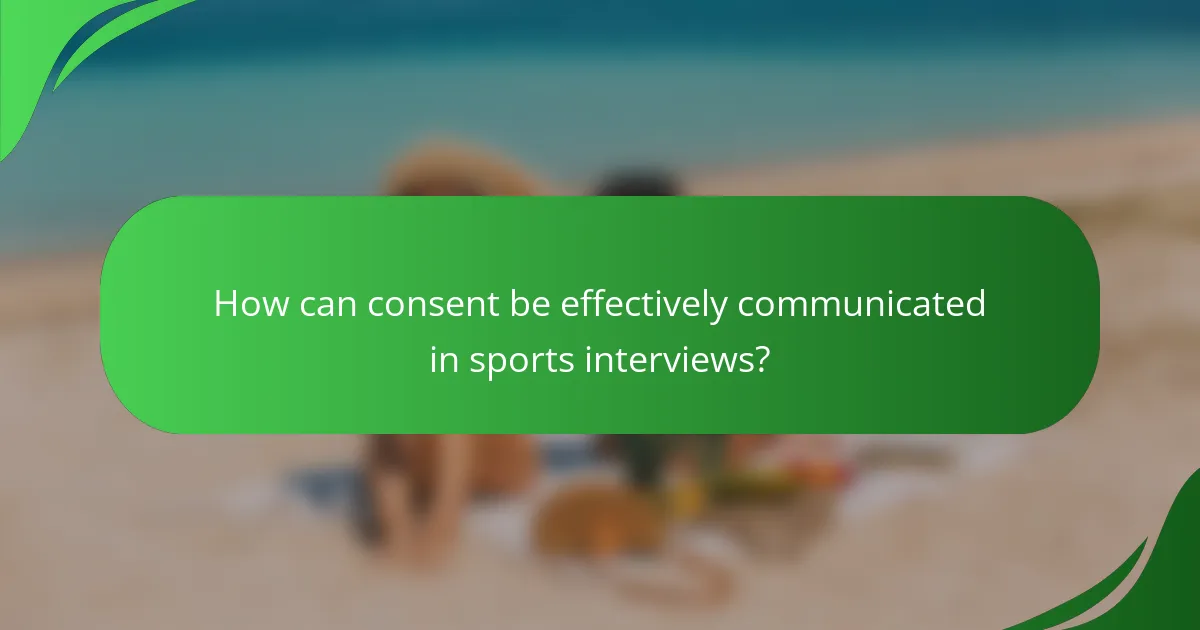
How can consent be effectively communicated in sports interviews?
Consent in sports interviews can be effectively communicated through clear language, written documentation, and verbal confirmation. These methods ensure that all parties understand the terms of the interview and agree to them, fostering a respectful and ethical environment.
Clear language and terminology
Using clear language and terminology is essential for effective communication of consent in sports interviews. Avoid jargon or ambiguous terms that may confuse the interviewee. Instead, use straightforward language that precisely outlines what the interview entails, including topics to be discussed and how the information will be used.
For example, instead of saying “We will cover your performance,” specify “We will discuss your recent game performance and your thoughts on the team’s strategy.” This clarity helps ensure that the interviewee fully understands what they are consenting to.
Written consent forms
Written consent forms serve as a formal record of the interviewee’s agreement to participate. These forms should clearly outline the purpose of the interview, how the information will be used, and any potential risks involved. Providing a copy of the signed form to the interviewee can enhance transparency.
When drafting a consent form, include sections for the interviewee to specify their preferences regarding confidentiality and the use of their statements. This not only protects their rights but also builds trust between the interviewer and the interviewee.
Verbal consent confirmation
Verbal consent confirmation is a crucial step that reinforces the agreement made in writing. Before starting the interview, the interviewer should summarize the key points of the consent form and ask the interviewee if they have any questions or concerns. This dialogue helps clarify any uncertainties.
Additionally, it is good practice to ask for verbal confirmation of consent at the beginning of the interview. A simple statement like, “Do you agree to proceed with this interview under the terms we discussed?” can ensure that the interviewee feels comfortable and respected throughout the process.
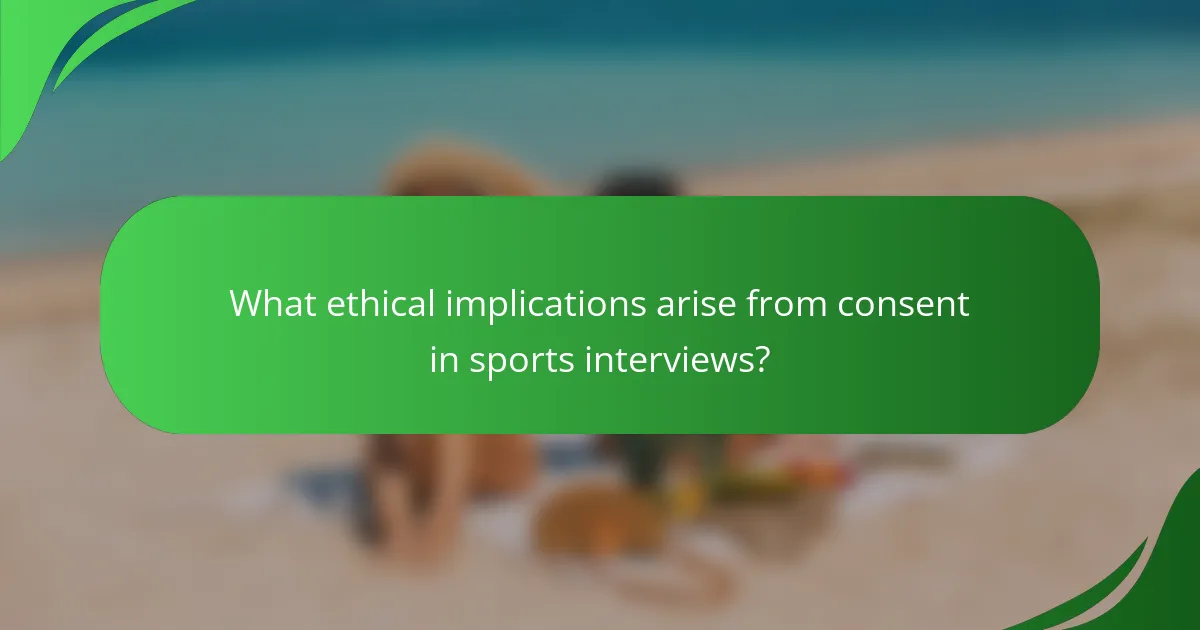
What ethical implications arise from consent in sports interviews?
Consent in sports interviews carries significant ethical implications, primarily related to the treatment of athletes and the integrity of media reporting. Ensuring that athletes provide informed consent protects their rights and fosters trust between them and the media.
Potential exploitation of athletes
Athletes, especially those in vulnerable positions, may be at risk of exploitation during interviews. Media representatives might pressure them into discussing sensitive topics or sharing personal experiences without proper consent, leading to potential emotional distress. It is crucial for media professionals to respect boundaries and prioritize the well-being of athletes.
To mitigate exploitation, interviewers should establish clear communication about the content and purpose of the interview. Athletes should feel empowered to decline questions that make them uncomfortable, ensuring their autonomy is respected.
Impact on media credibility
Media credibility can be severely impacted if consent is not prioritized in sports interviews. When athletes feel coerced or misrepresented, it can lead to public distrust in media outlets and their reporting practices. Ethical journalism hinges on transparency and respect for interview subjects.
To maintain credibility, media organizations should implement strict guidelines regarding consent. Training journalists on ethical interviewing practices can help ensure that athletes are treated fairly and that their voices are accurately represented.
Legal ramifications of non-consent
Failing to obtain proper consent from athletes during interviews can lead to legal consequences, including lawsuits for defamation or invasion of privacy. Athletes have the right to control how their image and words are used, and any breach of this can result in significant legal repercussions for media entities.
Media professionals should familiarize themselves with relevant laws regarding consent and privacy in their jurisdiction. Documenting consent, especially for sensitive topics, can serve as a protective measure against potential legal issues.
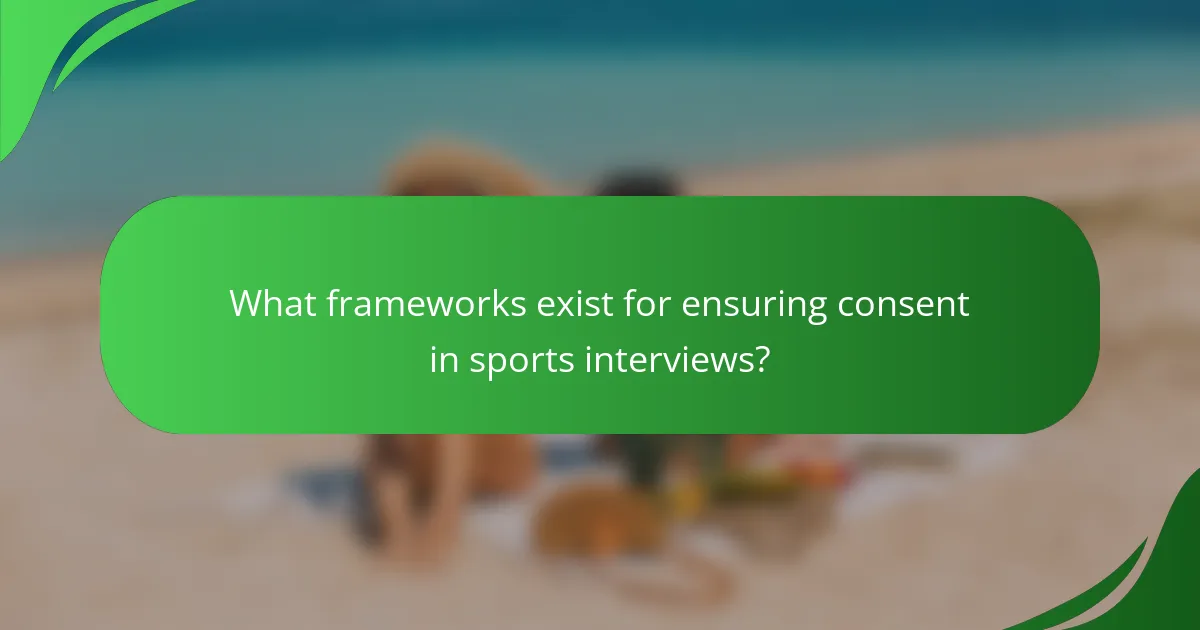
What frameworks exist for ensuring consent in sports interviews?
Several frameworks exist to ensure consent in sports interviews, focusing on ethical practices and legal standards. These frameworks help protect the rights of athletes while promoting transparency and trust between interviewers and interviewees.
Industry guidelines from sports organizations
Sports organizations often establish guidelines to ensure that consent is obtained before interviews. These guidelines typically include obtaining verbal or written consent, clarifying the purpose of the interview, and informing athletes about how their responses will be used. For example, the International Olympic Committee emphasizes the need for clear communication regarding the scope and context of interviews.
Additionally, many leagues and federations have specific protocols for media interactions, which may include consent forms or agreements that outline the rights of the athlete and the responsibilities of the interviewer. Adhering to these guidelines fosters a respectful environment and minimizes misunderstandings.
Best practices from journalism ethics
Journalism ethics advocate for obtaining informed consent, ensuring that interview subjects understand what they are agreeing to. This includes explaining the nature of the questions, the intended audience, and any potential consequences of their statements. Ethical journalists prioritize transparency and respect for the interviewee’s autonomy.
Common best practices include asking open-ended questions, allowing athletes to express their thoughts freely, and providing the option to retract statements if they feel uncomfortable. Journalists should also be aware of power dynamics and strive to create a safe space for athletes to share their experiences without coercion.
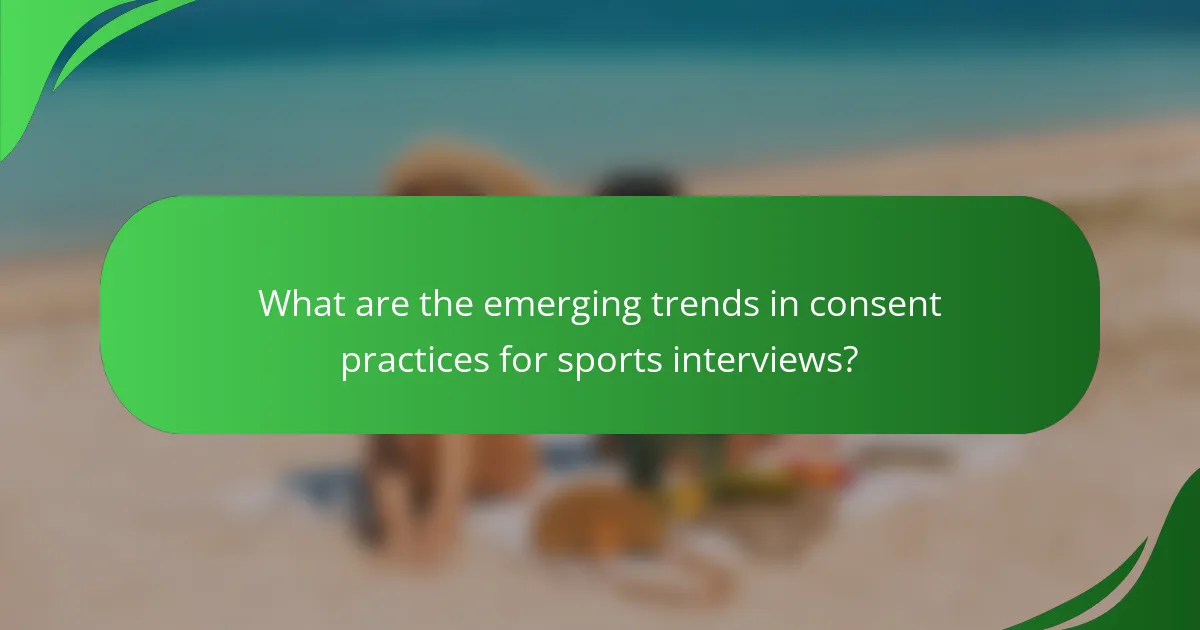
What are the emerging trends in consent practices for sports interviews?
Emerging trends in consent practices for sports interviews focus on enhancing transparency and respect for athletes’ rights. These practices are increasingly incorporating technology and standardized protocols to ensure informed consent is obtained effectively.
Increased use of digital consent tools
The adoption of digital consent tools is transforming how consent is managed in sports interviews. These tools often include mobile applications and online platforms that streamline the consent process, making it easier for athletes to understand what they are agreeing to.
Digital tools can provide clear information about the interview’s purpose, potential risks, and how the data will be used. This transparency helps athletes make informed decisions and can significantly reduce misunderstandings.
For example, an athlete might receive a digital consent form via an app before an interview, allowing them to review and sign it at their convenience. This method not only saves time but also ensures that consent is documented and easily accessible for future reference.
